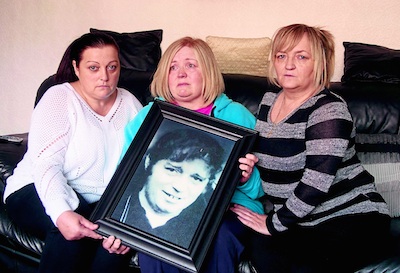
The family of a north Belfast man shot dead by loyalists using a gun taken from a British Army base 40 years ago is to sue the British Ministry of Defence.
Father-of-three Terence McCafferty and work colleague James McCloskey died after a loyalist murder gang fired into a workman’s hut on the outskirts of Belfast in January 1974.
It emerged at an inquest that the workmen were asked if there were any “Prods” in the hut who were told to kneel down while their Catholic colleagues were ordered to the rear of the building and shot.
The 37-year-old worked for the Electricity Service and was laying cables in the area when the killers struck.
One of the guns used was a Sterling sub machine gun which had been taken by loyalists from a joint Ulster Defence Regiment/Territorial Army base in Lurgan in October 1972.
The same weapon was also used by the UVF to murder teenager Henry Cunningham in August 1973.
Mr McCafferty’s daughters Margaret Murphy, Denise McKenna and Terri Tennyson have vowed to fight for justice for their murdered father. Mrs Murphy, who was 13 when her father was killed, said the PSNI have never spoken to her family in connection with his death.
“We were treated very badly over the years,” she said.
“We were failed by the law in every way. They didn’t tell us he was dead and they didn’t inform us it was security force guns used to kill him.
“How can we put out trust in something that failed us in the first place.”
Mrs Murphy also revealed that the Historical Enquiries Team, which investigated the case, failed to tell her family that the weapon used to kill her father had been taken from a UDR base. Instead, the family was provided with the vital information by human rights group, the Pat Finucane Centre.
“It makes us very angry and person ally speaking I have no faith in the PSNI,” said Mrs Murphy.
She has no doubt there was collusion in her father’s murder and said she wants the state to “stand up and say they were wrong”.
She recounted the devastating impact of her father’s murder on her family.
“I remember me and my sister peeling spuds and making the Christmas dinner while my mammy lay in bed with depression. It makes you very, very angry.”
Mrs Murphy’s sister Terri Tennyson, who was aged 8 when her father was murdered, gave an emotional account of the last time she saw him.
“My mother said ‘good morning and God bless and watch yourself’ and he said ‘who would want to harm me’ and kissed her and went out to work,” she said.
The north Belfast woman said she continues to struggle with the loss of her father 40 years on.
“The older I get the worse it gets,” she said.
“I see my kids with their father and realise how much we missed out on.”
Anne Cadwallader from the Pat Finucane Centre said responsibility for Mr McCafferty’s death rests with British authorities.
“This was a catastrophic dereliction of duty by the British authorities that beggars belief that resulted in the murder of dozens if not scores of Catholic civilians,” she said.
The family’s lawyer, Kevin Winters, said the McCafferty family “know there will be no proper independent state-led inquiry” into their loved one’s murder.
“With the secretary of state making it clear that the government doesn’t want any more inquiries into conflict issues and the PSNI saying there are less resources to deal with the past it’s depressingly clear to these families that they must seek their own remedies.
“To that end we will be inviting the attorney general to examine the context within which these two killings took place on foot of requests for new inquests.”
![[Irish Republican News]](https://republican-news.org/graphics/title_gifs/rn.gif)
![[Irish Republican News]](https://republican-news.org/graphics/title_gifs/harp.gif)

